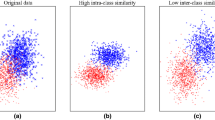Abstract
Attribute reduction plays a crucial role in eliminating redundant attributes of data. As an effective means to deal with numerical data, neighborhood rough set model has been widely used in attribute reduction. In this model, the determination of sample neighborhood relies on the calculation of distance between samples, which need to traverse all attributes of samples. This way will result in huge time consumption for high-dimensional data because the time consumption of solving reduction is closely related to the computational efficiency of sample neighborhood. In view of this, an attribute synthesis method based on the attribute similarity is put forward for solving above drawbacks. In this paper, firstly, all attributes are divided by K-means clustering into multiple attribute clusters. Secondly, the attributes in the same cluster are synthesized into a new pseudo-attribute. Then a new decision system can be formed by all the pseudo-attributes. Thirdly, the pseudo-attribute with the greatest importance is selected through the forward greedy search strategy in the new decision system. Finally, let the original attributes corresponding to the selected pseudo-attribute be an attribute subset, then we determine whether the subset satisfies the constraint condition of reduction. If not, the pseudo-attribute with the second greatest importance is considered to conduct above step, until the attribute subset satisfying the constraint condition is calculated and output as the reduction. In order to verify the effectiveness of the proposed method, the comparative experiments are conducted on 4 UCI standard datasets and 4 face datasets. The experimental results show that the proposed method can not only significantly reduce the time consumption of attribute reduction, but also relatively improve the classification performance of the reduction. Moreover, the more attributes the sample own, the more significant improvement the method has.
Access this chapter
Tax calculation will be finalised at checkout
Purchases are for personal use only
Similar content being viewed by others
References
Pawlak, Z.: Rough Sets: Theoretical Aspects of Reasoning About Data. Kluwer Academic Publishers (1992)
Wang, J.B., Wu, W.Z., Tan, A.H.: Multi-granulation-based knowledge discovery in incomplete generalized multi-scale decision systems. Int. J. Mach. Learn. Cybernet. 13(12), 3963–3979 (2022)
Hu, Q.H., An, S., Yu, D.R.: Soft fuzzy rough sets for robust feature evaluation and selection. Inf. Sci. 180(22), 4384–4400 (2010)
Qian, Y.H., Liang, X.Y., Wang, Q., et al.: Local rough set: a solution to rough data analysis in big data. Int. J. Approximate Reasonging 97(1), 38–63 (2018)
Ju, H.R., Li, H.X., Yang, X.B., et al.: Cost-sensitive rough set: a multi-granulation approach. Knowl.-Based Syst. 123(1), 137–153 (2017)
Yao, Y.Y., Zhang, X.Y.: Class-specific attribute reducts in rough set theory. Inf. Sci. 418–419, 601–618 (2017)
Slowinski, R., Vanderpooten, D.: A generalized definition of rough approximations based on similarity. IEEE Trans. Knowl. Data Eng. 12(2), 331–336 (2000)
Xu, T.H., Wang, G.Y., Yang, J.: Finding strongly connected components of simple digraphs based on granulation strategy. Int. J. Approximate Reasoning 118, 64–78 (2020)
Dubois, D., Prade, H.: Rough fuzzy sets and fuzzy rough sets. Int. J. Gener. Syst. 17, 191–209 (1990)
Lin, T.Y.: Granular Computing on binary relations I: data mining and neighborhood systems. In: Skoworn, A., Polkowshi, L. (eds.) Rough Sets in Knowledge Discovery, pp. 107–121. Physica-Verlag (1998)
Hu, Q.H., Yu, D.R., Xie, Z.X.: Neighborhood classifiers. Expert Syst. Appl. 34, 866–876 (2008)
Gong, Z.C., Liu, Y.X., Xu, T.H., et al.: Unsupervised attribute reduction: improving effectiveness and efficiency. Int. J. Mach. Learn. Cybernet. 13(11), 3645–3662 (2022)
Fang, Y., Cao, X.M., Wang, X., et al.: Three-way sampling for rapid attribute reduction. Inf. Sci. 609, 26–45 (2022)
Wu, Z.J., Mei, Q.Y., Zhang, Y., et al.: A distributed attribute reduction algorithm for high-dimensional data under the spark framework. Int. J. Comput. Intell. Syst. 15(1), 1–14 (2022)
Yang, T.L., Li, Z.W., Li, J.J.: Attribute reduction for set-valued data based on prediction label. Int. J. Gener. Syst. 1–31 (2023)
Gao, C., Zhou, J., Xing, J., et al.: Parameterized maximum-entropy-based three-way approximate attribute reduction. Int. J. Approximate Reasoning 151, 85–100 (2022)
Chen, Q., Xu, T.H., Chen, J.J.: Attribute reduction based on lift and random sampling. Symmetry 14(9), 1828 (2022)
Yan, W.W., Ba, J., Xu, T.H., Yu, H.L., Shi, J.L., Han, B.: Beam-influenced attribute selector for producing stable reduct. Mathematics 10(4), 553 (2022)
Jiang, Z.H., Yang, X.B., Yu, H.L., et al.: Accelerator for multi-granularity attribute reduction. Knowl.-Based Syst. 177, 145–158 (2019)
Gao, Y., Chen, X.J., Yang, X.B., et al.: Neighborhood attribute reduction: a multicriterion strategy based on sample selection. Information 9, 282–302 (2018)
Hu, Q.H., Che, X.J., Zhang, L., et al.: Rank entropy based decision trees for monotonic classification. IEEE Trans. Knowl. Data Eng. 24, 2052–2064 (2012)
Liu, K.Y., Yang, X.B., Yu, H.L., et al.: Rough set based semi-supervised feature selection via ensemble selector. Knowl.-Based Syst. 165, 282–296 (2019)
Gao, C., Lai, Z.H., Zhou, J., et al.: Granular maximum decision entropy-based monotonic uncertainty measure for attribute reduction. Int. J. Approximate Reasoning 104, 9–24 (2019)
Yang, X.B., Liang, S.C., Yu, H.L., et al.: Pseudo-label neighborhood rough set: measures and attribute reductions. Int. J. Approximate Reasoning 105, 115–129 (2019)
Acknowledgements
This work is supported by the National Natural Science Foundation of China (Grant Nos. 62006099, 62076111), and the Key Laboratory of Oceanographic Big Data Mining & Application of Zhejiang Province (No. OBDMA202104).
Author information
Authors and Affiliations
Corresponding author
Editor information
Editors and Affiliations
Rights and permissions
Copyright information
© 2023 The Author(s), under exclusive license to Springer Nature Switzerland AG
About this paper
Cite this paper
Shi, C., Xu, T., Cheng, F., Yang, X., Chen, J. (2023). An Acceleration Method for Attribute Reduction Based on Attribute Synthesis. In: Campagner, A., Urs Lenz, O., Xia, S., Ślęzak, D., Wąs, J., Yao, J. (eds) Rough Sets. IJCRS 2023. Lecture Notes in Computer Science(), vol 14481. Springer, Cham. https://doi.org/10.1007/978-3-031-50959-9_5
Download citation
DOI: https://doi.org/10.1007/978-3-031-50959-9_5
Published:
Publisher Name: Springer, Cham
Print ISBN: 978-3-031-50958-2
Online ISBN: 978-3-031-50959-9
eBook Packages: Computer ScienceComputer Science (R0)




